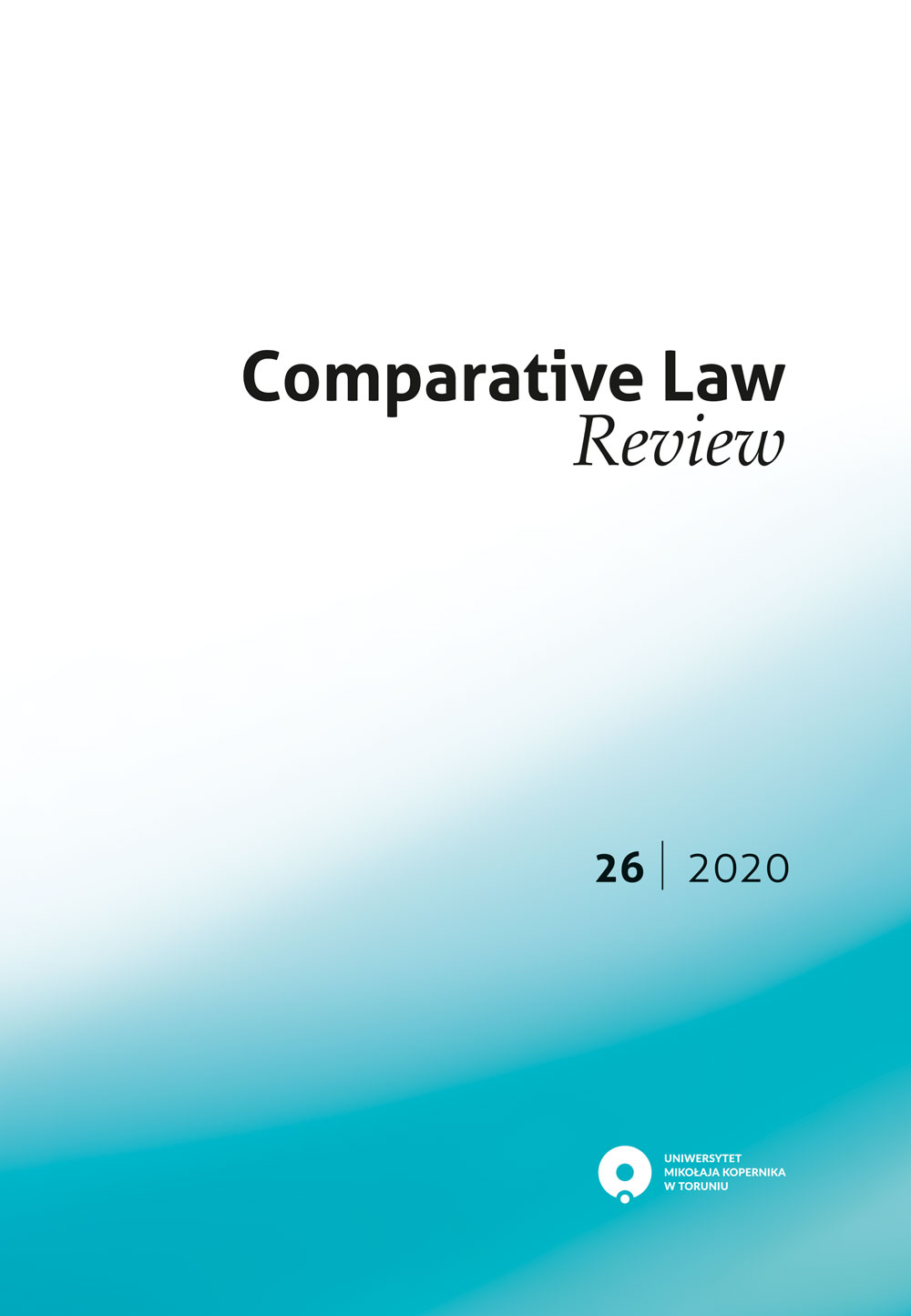The Concept of Necessity. Some Remarks
DOI:
https://doi.org/10.12775/CLR.2020.005Keywords
necessity, state of necessity, law of necessity, criminal law, constitutional law, public international lawAbstract
The article aims to provide a general view of the concept of necessity (la.: necessitas) and its selected manifestations in the legal sphere (theory and practice).
The author proves that at the most general level of considerations, the reaction to an emergency always fits in with a specific philosophy of law that conditions the processes of its creation, application and validity. The article mentions several variants of answers to the following fundamental questions: Can the law provide for any exceptions? Should the activity − which was to deal with a particular threat − always be grounded in positive law? If not, how should the acts outside the scope of this law be treated? These themes have been present in legal thought for centuries. Within individual areas of law, references to necessity and the state of necessity manifest themselves in different ways. Selected institutions of canon, criminal, constitutional and international law will be provided as examples and discussed later on. As part of a synthetic review of these cases, the similarities and differences in the perception of necessity (state of necessity) and the ways of integrating it into individual legal solutions are presented.
References
K. Dobrzeniecki, Prawo wobec sytuacji nadzwyczajnej. Między legalizmem a koniecznością, Towarzystwo Naukowe Organizacji i Kierownictwa "Dom Organizatora" w Toruniu, 2018, p. 15.
T. Aquinas, Treatise on law, transl. J. B. Atkinson, Hackett Publishing, 2000, p. 61 [question 96, article 6].
G. Agamben, State of exception, trans. K. Attell, The University of Chicago Press, 2006, para 26.
N. Machiavelli, The prince, transl. J. Atkinson, Hackett Publishing 2008.
D. A. Desierto, Necessity and national emergency clauses. Sovereignty in modern treaty interpretation, Brill, 2012, pp. 69-70.
H. Grotius, The rights of war and peace, Book 2, trans. R. Tuck, Liberty Fund, p. 569 ff.
S. Pufendorf, On the duty of man and citizen according to natural law, trans. M. Silverthorne, Cambridge University Press, 1991, p. 53.
A. W. Heffter, Das europäische Völkerrecht der Gegenwart, Schroeder 1844, para 119.
D. Luban, Military necessity and the cultures of military law, “Leiden Journal of International Law” 2013, vol. XXVI, p. 341.
C. von Clausewitz, On war, transl. M. Howard, P. Paret, Oxford University Press, 2007, pp. 31-44; S. Horton, Military necessity, torture, and the criminality of lawyers, in: W. Kaleck, M. Ratner, T. Singelstein, P. Weiss (eds.), International prosecution of human rights crimes, Springer, 2007, p. 172.
L. Oppenheim, International law. A treatise, vol. II, Longmans, 1905, p. 79.
K. Pennington, Innocent III and the ius commune, in: Grundlagen des Rechts: Festschrift für Peter Landau zum 65. Geburtstag, R. Helmholz et al. (eds.), Paderborn, 2000, p. 353 ff.
J. Syryjczyk, Stan wyższej konieczności w prawie karnym kanonicznym, „Prawo kanoniczne: kawrtalnik prawno-historyczny” 1982, vol. 25, p. 282,
J. Hollweck, Die kirchliche Strafgesetze: zusammengestellt und commentirt, Franz Kirchheim, 1899, p. 82.
K. Ghanayim, Excused neccessity in western legal philosophy, “Canadian Journal of Law and Jurisprudence” 2006, no.1, p. 34.
J. Blomsma, Mens rea and defences in European criminal law, Intersentia, 2012, p. 371.
M. Gur-Arye, Should the criminal law distinguish between necessity as a justification and necessity as an excuse?, “The Law Quarterly Review” 1986, vol. CII, p. 71-75;
A. Brudner, A theory of necessity, “Oxford Journal of Legal Studies” 1987, no. 3, pp. 341-352.
A. Zoll, W. Wróbel, Polskie prawo karne. Część ogólna, ZNAK, 2010, p. 346.
W. Feldman, Theories of emergency powers. A comparative analysis of American martial law and the French state of siege, “Cornell International Law Journal” 2005, vol. XXXVIII, no.3, p. 1024.
Ch. Fairman, The law of martial rule and the national emergency, “Harvard Law Review” 1942, vol. LV, no.8, p. 1259.
K. Prokop, Modele stanu nadzwyczajnego, Wydawnictwo Temida 2, 2012, pp. 117-121.
H. A. Washington (ed.), The writings of Thomas Jefferson, vol. V, Being his autobiography, correspondence, reports, messages, addresses, and other writings, official and private, John C. Riker, 1854, pp. 40-41, 378-380.
F. B.Wiener, A practical manual of martial law, Military Service Publishing, 1940, p. 16.
C. J. Friedrich, Constitutional government and democracy. Theory and practice in Europe and America, Ginn and Companym 1946, p. 239.
S. P. Jagota, State responsibility: circumstances precluding wrongfulness, ”Netherlands Yearbook of International Law” 1985, vol. XVI, pp. 250-255.
L. May, War crimes and just War, Cambridge University Press, 2007, p. 206.
J. Crawford, Second report on state responsibility, UN Doc A/CN.4/498 1999, para 278, p. 69.
G. Schwarzenberger, Fundamental principles of international law, „Collected Courses of the Hague Academy of International Law” 1955, vol. LXXXVII, p. 343.
Draft Articles on Responsibility of States for Internationally Wrongful Acts, with Commentaries, „Yearbook of the International Law Commission” 2001, vol. II, part. II, New York 2007.
S. Heathcote, Circumstances precluding wrongfulness in the ILC Articles on State Responsibility. Necessity, in:
J Crawford, A. Pellet, S. Olleson et al. (eds), The Law of international responsibility, Oxford University Press, 2010., p. 497.
A. J. Poblador, The defense of necessity in international law, “Philippine Law Journal” 1982, vol. LVII, p. 353-359.
Downloads
Published
How to Cite
Issue
Section
Stats
Number of views and downloads: 1358
Number of citations: 0



